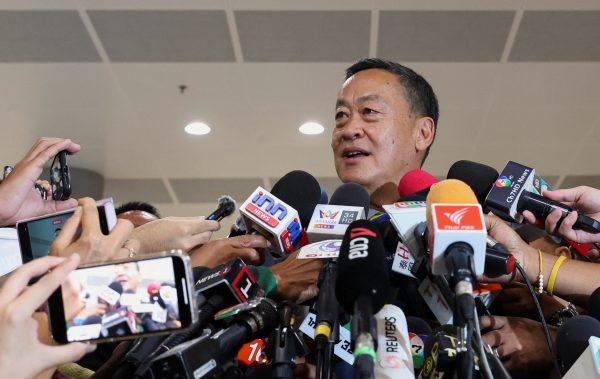It is apparent that Thailand’s democratic processes have been subverted by not only a deeply illiberal constitution but also by a set of opaque machinations reminiscent of those that elevated conservative former prime minister Abhisit Vejajiva to office in 2008. Then as now, the voice of the people is less important than backroom negotiations between powerful elites.
It might be thought that the joint sitting of Parliament on 22 August that elected Pheu Thai’s Srettha Thavisin as Thailand’s 30th prime minister represents a significant realignment of Thai politics, ending two decades of bitter conflict, a coalition comprising Pheu Thai and former government parties. It is much more likely that this is but a tactical manoeuvre as the durable conservative establishment adapts its system of competitive authoritarianism as a consequence of its parties’ poor showing in Thailand’s 14 May election.
With the help of the unelected Senate, the conservatives could block the election winner Move Forward, as they did on 13 and 19 July. But to establish an alternative government, the military-proxy parties and their fellow travellers had only two bad options. One was to form an inherently fragile minority government. The other was to reach an accommodation with their former adversary Pheu Thai. They chose the latter.
The royal pardoning of exiled former prime minister and Pheu Thai dynast Thaksin Shinawatra was the lynchpin of the deal that got Thaksin home, the military proxy parties in government and the dangerously reformist progressives sidelined. The issuing of Thaksin’s pardon, reducing his time in jail to a maximum of one 2023 election, confirmed the palace’s involvement in the tawdry affair. Thailand’s media will say nothing about this for fear of prosecution under the lese majeste law, showing its enduring utility as a political tool.
The deal even incorporated subplots, shown in the patterns of Senate voting. Srettha received the bulk of his Senate support from former military officers aligned with now-former prime minister Prayuth Chan-ocha and leader of the United Thai Nation Party. But Senators close to former deputy prime minister and Palang Pracharat leader Prawit Wongsuwan abstained or voted against Srettha. Prawit was hoping for Srettha to be ruled out, allowing him to form a government with Pheu Thai support. But Prayuth denied him this opportunity, reflecting the continued rivalry between the two ‘bigmen’ of Thai politics.
The political fallout for Pheu Thai is uncertain. The announcement that Pheu Thai would ally with military proxy parties to increase its lower house majority — after promising to exclude the ‘two uncles’ Prayuth and Prawit — may have significant long-term consequences. One of Pheu Thai’s strongest and most visible spokesmen, Nattawut Saikua, resigned immediately. Thai public anger was evident, in social media and in other public statements such as the Chiang Mai restaurant which boldly displayed a sign reading ‘lost faith in Pheu Thai, will not vote for them again’.
The votes of disenchanted Pheu Thai voters may now flow to Move Forward. Leader of the Move Forward Party Pita Limcharoenraj and his lieutenants — playing the long game for the 2023 election when the Senate will no longer take part in selecting the prime minister — will be hoping so. But the path forward is perilous. Pita has his own share-holding case, but it may be Move Forward’s tenacity in advocating for reform of Article 112 that holds the real danger.
Exiled Thai dissident Somsak Jeamsatarakul, known as a conduit of intelligence from the palace, cites a source claiming that Vajiralongkorn opined in July that ‘some parties were worrying’ — likely a reference to Move Forward. Given that the Constitutional Court ruled in 2021 that calling for monarchical reform was tantamount to seeking to overthrow Thailand’s system of constitutional monarchy, Move Forward could face dissolution of not only its party executive, but even the disqualification of its 151 members of parliament.
Four years is a long time in politics. If a Srettha government governs competently, the wounds its betrayal caused may heal in time for it to present an attractive option for voters. But Srettha faces major hurdles. The 314-seat lower house coalition may not be stable enough for Srettha to complete his notionally four-year term. Policy differences, such as the cannabis decriminalisation policy could be divisive, and Srettha has his own corruption allegations to deal with. Srettha’s past business dealings were raised by some senators during the joint sitting and could be used as the basis of future court action.
Srettha also has a ministry not of his own choosing, made of many old faces from the former government. This is not a cabinet likely to be willing to take on major policy projects, such as reducing the power of Thailand’s business oligarchs. Srettha’s capacity to lift Thailand out of its persistent underperformance may be limited.
If Srettha’s rush towards implementing his party’s signature 10,000 baht (US$281) cash stimulus proposal and other economic stimulus measures is anything to go by, he and Pheu Thai’s executive are seized by the need to reinvent themselves before the next election.
Greg Raymond is Senior Lecturer at the Coral Bell School of Asia Pacific Affairs, The Australian National University.

